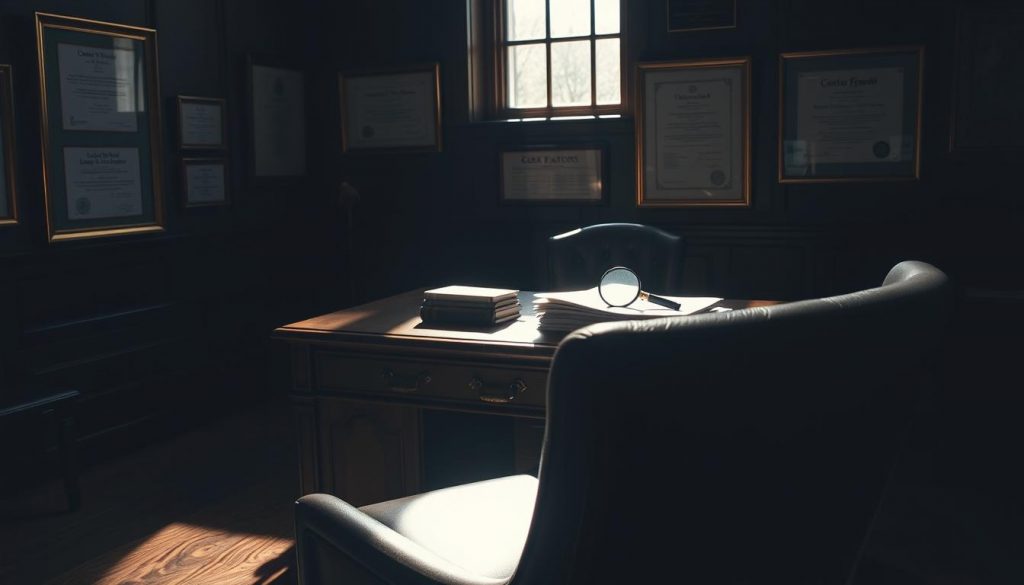Contesting a will can be a complex and emotionally challenging process. When a loved one passes away, the distribution of their estate according to their will can sometimes lead to disputes among family members and beneficiaries. If you are considering contesting a will, it is crucial to understand your rights and the legal framework that governs will disputes in the UK.
We recommend seeking legal advice from a specialist will dispute solicitor to navigate the intricacies of challenging a will. Our expert advice will guide you through the process, ensuring you are well-informed and prepared for the potential outcomes.
Key Takeaways
- Understand the grounds for contesting a will in the UK.
- Recognise the importance of seeking specialist legal advice.
- Be aware of the time limits for disputing a will.
- Learn about the potential outcomes of contesting a will.
- Discover the role of a will dispute solicitor in the process.
Understanding the Grounds for Challenging a Will
In the UK, the grounds for challenging a will are multifaceted, involving various legal considerations. When a will is contested, it’s often due to concerns regarding the testator’s intentions, capacity, or the circumstances under which the will was made.
Validity and Intention
A will can be challenged if there’s doubt about its validity or if the testator’s intentions are unclear. This includes situations where the will doesn’t comply with legal formalities, such as not being signed or witnessed correctly. We must consider whether the testator had knowledge and approval of the will’s contents.
Capacity of the Testator
The testator must have testamentary capacity when making the will, meaning they understand the nature of their actions and the consequences of their decisions. If the testator lacked mental capacity due to illness, dementia, or other factors, the will can be contested.
Undue Influence
If there’s evidence that the testator was subjected to undue influence by another person, the will can be challenged. This occurs when someone exerts pressure or coercion on the testator, resulting in a will that doesn’t reflect their true wishes.
Fraud or Forgery
Allegations of fraud or forgery are serious grounds for challenging a will. This includes situations where the will is forged, or the testator was deceived into making certain provisions.
To contest a will, one must gather substantial evidence to support their claim. This can involve:
- Witness statements
- Medical records
- Documentation showing suspicious circumstances
Understanding these grounds is crucial for anyone considering challenging a will. It’s a complex process, but with the right information and legal guidance, individuals can navigate the challenges effectively.

The Role of a Solicitor in Will Challenges
Seeking legal advice from a specialist solicitor is a key step when considering challenging a will. Contesting a will can be a complex and emotionally taxing process, and having professional guidance is invaluable.
When to Seek Legal Advice
If you’re considering contesting a will, it’s crucial to seek legal advice early on. A solicitor can help you understand your chances of success and guide you through the initial steps. They can also advise on the potential costs and outcomes, helping you make an informed decision.
Early legal advice can be beneficial in several ways:
- Understanding your legal standing and the grounds for contesting the will.
- Receiving guidance on the necessary documentation and evidence required.
- Being advised on the potential timeline and any legal deadlines.
Finding a Specialist Solicitor
Not all solicitors specialise in will disputes. When looking for a solicitor, consider their experience in handling cases related to contesting a will. A specialist will have a deeper understanding of the relevant laws and procedures.
Here are some factors to consider when selecting a solicitor:
| Criteria | Description |
|---|---|
| Experience | Look for solicitors with a proven track record in will disputes. |
| Specialisation | Ensure they specialise in the area of wills and probate. |
| Client Reviews | Check for positive reviews and testimonials from previous clients. |
Costs Associated with Legal Advice
The costs of seeking legal advice can vary widely depending on the complexity of the case and the solicitor’s fees. It’s essential to discuss costs upfront with your solicitor to understand what to expect.
Some common fee structures include:
- Hourly rates.
- Fixed fees for specific services.
- No win, no fee arrangements in some cases.
Understanding the costs and the potential outcomes can help you make a more informed decision about whether to proceed with contesting a will. A specialist solicitor can provide you with the necessary guidance and support throughout the process.
The Process of Contesting a Will
The process of contesting a will involves several key steps, from seeking legal advice to gathering evidence. Understanding these steps is crucial for navigating the legal complexities involved in challenging a will.
Initial Steps to Take
The first step in challenging a will is to seek legal advice from a specialist solicitor. They will help you understand the grounds for contesting a will and guide you through the initial steps. In some cases, you may be able to place a caveat on the estate, which prevents the grant of probate from being issued. For more information on contesting a will, you can visit https://www.willful.co/learn/contesting-a-will.
Gathering Evidence
Gathering evidence is a critical part of contesting a will. This can include witness statements, medical records, and any other relevant documentation that supports your claim. The evidence should be carefully collected and presented to strengthen your case.
Filing a Caveat
Filing a caveat is a legal step that can be taken to prevent the grant of probate from being issued. This is typically done when there is a dispute over the validity of the will. By filing a caveat, you can ensure that the estate is not distributed until the dispute is resolved.
| Step | Description | Importance |
|---|---|---|
| Seeking Legal Advice | Consulting with a specialist solicitor to understand the grounds for contesting a will. | High |
| Gathering Evidence | Collecting relevant documentation such as witness statements and medical records. | High |
| Filing a Caveat | Preventing the grant of probate from being issued to halt the distribution of the estate. | Medium |
Time Limits for Will Challenges
While there’s no strict time limit to contest the validity of a will, acting quickly is highly advisable. Delays can lead to complications and potentially impact the outcome of your challenge.
Legal Deadlines Explained
In the UK, the rules surrounding the time limits for contesting a will are somewhat complex. Technically, you can contest a will at any time; however, the sooner you act, the better your chances of a successful outcome. It’s essential to understand that contesting probate and challenging a will involve different legal processes and timelines.
For instance, if you’re considering making a claim under the Inheritance (Provision for Family and Dependants) Act 1975, you generally have six months from the date of the Grant of Probate to make your claim. Missing this deadline can significantly limit your options.

Importance of Acting Promptly
Acting promptly is crucial when you decide to contest a will. The longer you wait, the more challenging it becomes to gather evidence, locate witnesses, and build a strong case. Moreover, delays can lead to assets being distributed, making it harder to achieve a favorable outcome.
By taking swift action, you can:
- Preserve your rights and options
- Gather evidence while it’s still readily available
- Avoid potential complications arising from delayed actions
It’s also worth noting that the court’s attitude towards delayed claims can be unfavorable. Judges may view late claims as an attempt to unfairly disrupt the distribution of the estate or as a sign of lack of genuine intent.
Therefore, if you’re considering challenging a will, it’s vital to seek legal advice as soon as possible to understand the time limits and the best course of action for your specific situation.
Types of Wills You Can Challenge
In the UK, wills come in various forms, and knowing these can help in challenging them. When a will is contested, it’s essential to understand the type of will you’re dealing with.
Formal Wills
Formal wills are typically drawn up by solicitors and are the most common type of will. They are signed in the presence of two witnesses, making them legally binding documents. However, even formal wills can be challenged if there are grounds to believe they were not properly executed or if there are suspicions of undue influence.
For instance, if a family member notices that the deceased was under significant pressure from another family member when making the will, they might contest it. Formal wills can be challenged on several grounds, including lack of capacity, undue influence, or improper execution.
Holographic Wills
Holographic wills, on the other hand, are written entirely in the handwriting of the testator. While they are legally recognized in some jurisdictions, their validity can be more challenging to establish. In the UK, holographic wills are not necessarily invalid, but they can be more susceptible to challenges due to the lack of formal witnessing.
For example, a holographic will might be contested if there’s a question about the testator’s handwriting or if the will seems to have been written under duress. The informal nature of holographic wills can make them more vulnerable to disputes.
Informal Wills
Informal wills, sometimes referred to as ‘deathbed wills,’ are made in urgent circumstances. These might not follow the traditional formalities of will-making, such as being witnessed. While they can be valid under certain conditions, they are often subject to challenges.
Informal wills can be contested on grounds such as lack of proper witnessing or if there’s suspicion that the will doesn’t truly reflect the testator’s wishes. It’s crucial to seek legal advice when dealing with informal wills to understand the potential grounds for a challenge.
To summarize, the following table outlines the key characteristics and potential challenges of the different types of wills:
| Type of Will | Characteristics | Potential Challenges |
|---|---|---|
| Formal Will | Drawn up by solicitors, signed in the presence of two witnesses | Lack of capacity, undue influence, improper execution |
| Holographic Will | Written entirely in the testator’s handwriting | Validity, handwriting verification, duress |
| Informal Will | Made in urgent circumstances, may lack formal witnessing | Lack of witnessing, true reflection of testator’s wishes |
How to Gather Evidence for Your Challenge
When contesting a will, gathering robust evidence is crucial to support your claim. The process involves understanding the types of evidence needed, obtaining witness statements, and collecting medical records, among other relevant documents.
Types of Evidence Needed
The evidence required to contest a will can vary depending on the grounds for your challenge. Generally, you will need to provide documentation that supports your claim, such as proof of undue influence, lack of capacity, or fraud.
Some of the key types of evidence include:
- Witness statements from individuals who knew the testator
- Medical records that assess the testator’s mental capacity
- Financial records that demonstrate the testator’s financial situation
- Correspondence or other documents that may indicate undue influence
Witness Statements
Witness statements are a critical component of your evidence. These statements should come from individuals who have first-hand knowledge of the testator’s circumstances, such as family members, friends, or healthcare professionals.
When gathering witness statements, it’s essential to ensure that they are detailed and provide specific examples to support your claim. A strong witness statement should include:
- The witness’s relationship with the testator
- Observations relevant to the challenge (e.g., the testator’s mental state)
- Any interactions that may be pertinent to the case

Medical Records
Medical records are vital when challenging a will on the grounds of the testator’s capacity. These records provide an objective assessment of the testator’s mental and physical health at the time of making the will.
To effectively use medical records as evidence, you should:
- Obtain records from the relevant healthcare providers
- Highlight sections that are relevant to your case
- Ensure the records are up-to-date and accurately reflect the testator’s condition
The following table summarises the key types of evidence and their relevance to contesting a will:
| Type of Evidence | Relevance | Examples |
|---|---|---|
| Witness Statements | Provides first-hand accounts of the testator’s circumstances | Testimony from family, friends, or healthcare professionals |
| Medical Records | Assesses the testator’s mental capacity | Doctors’ notes, psychiatric evaluations |
| Financial Records | Demonstrates the testator’s financial situation | Bank statements, investment portfolios |
By gathering and presenting robust evidence, you can strengthen your case when contesting a will. It’s advisable to seek legal guidance to ensure that your evidence is collected and presented effectively.
Mediation as an Alternative Dispute Resolution
Mediation is increasingly recognised as a valuable method for resolving disputes related to wills without going to court. When a will is contested, emotions can run high, and the adversarial nature of court proceedings can exacerbate tensions among family members. Mediation offers a more collaborative approach, allowing parties to engage in constructive dialogue facilitated by a neutral third-party mediator.
Advantages of Choosing Mediation
Mediation has several benefits when it comes to contesting a will. It is generally less costly and faster than going through the court system. Moreover, mediation allows for more creative solutions that can satisfy all parties involved, rather than the binary outcome of a court judgment.
- Cost-effective: Reduces legal fees and other costs associated with court proceedings.
- Time-efficient: Typically resolves disputes more quickly than litigation.
- Preserves relationships: Encourages open communication and cooperation among parties.
- Flexible outcomes: Allows for more nuanced and mutually beneficial agreements.
The Mediation Process Explained
The mediation process begins with the selection of a mediator, an impartial individual with expertise in dispute resolution. The mediator facilitates a discussion between the parties, helping them to identify common goals and work towards a mutually acceptable resolution.
| Step | Description |
|---|---|
| 1. Initial Meeting | Parties meet with the mediator to outline the dispute and the mediation process. |
| 2. Identifying Issues | The mediator helps the parties identify the key issues in dispute. |
| 3. Negotiation | Parties engage in facilitated negotiation to reach a settlement. |
| 4. Agreement | A mutually acceptable agreement is drafted and signed by the parties. |
By opting for mediation, individuals contesting a will can potentially avoid the stress and uncertainty of court proceedings, achieving a resolution that respects the interests of all parties involved.
Common Misconceptions About Challenging a Will
There are several common misconceptions surrounding the process of challenging a will in the UK. These misconceptions can often deter individuals from pursuing their rightful claims or understanding their legal standings.
It’s Only for Family Members
A common myth is that only family members can contest a will. However, theoretically, anyone can challenge a will if they have a valid claim. This includes beneficiaries from previous wills, individuals who were promised something in the will but weren’t included in the final version, and even charities or other organisations.
For instance, if a previous will named a charity as a beneficiary, and they were removed in the latest version, they might have grounds to contest the changes.
Challenging a Will is Always Costly
While it’s true that contesting a will can involve legal costs, it’s not always prohibitively expensive. The costs can vary widely depending on the complexity of the case, the solicitor’s fees, and whether the dispute is resolved through mediation or goes to court.
- No Win, No Fee arrangements may be available in some cases.
- Legal Aid might be an option for those who qualify.
- Mediation can be a cost-effective alternative to litigation.
You Must Be Named in the Will
Another misconception is that you must be named in the will to contest it. In reality, individuals not named in the will but who have a valid claim under the Inheritance (Provision for Family and Dependants) Act 1975 can still make a claim.
For example, a dependent relative or someone who was financially dependent on the deceased might be able to make a claim, even if they’re not mentioned in the will.
Understanding these misconceptions is crucial for anyone considering challenging a will. It’s essential to seek professional advice to navigate the complexities and ensure the best possible outcome.
The Emotional Impact of Contesting a Will
Contesting a will is not just a legal process; it’s an emotionally charged journey that can significantly affect family dynamics and individual well-being. The emotional impact of contesting a will should not be underestimated, as it can strain relationships and cause considerable distress.
When a will is contested, the emotional strain on family members can be substantial. The process can uncover underlying tensions and create new conflicts, making it essential to manage family relationships carefully during this time.
Managing Family Relationships
Managing family relationships during a will contest requires empathy, understanding, and effective communication. It’s crucial to acknowledge the emotional needs of all parties involved and to seek support when needed.
Here are some strategies for managing family relationships during this challenging time:
- Encourage open and honest communication among family members.
- Seek the help of a mediator or counselor if tensions rise.
- Focus on the issue at hand, rather than making personal attacks.
- Be willing to listen to and consider different perspectives.
Coping with Stress and Anxiety
Coping with the stress and anxiety of contesting a will is vital for maintaining emotional well-being. It’s essential to recognize the signs of stress and to take proactive steps to manage it.
Some effective ways to cope with stress and anxiety include:
| Strategy | Description |
|---|---|
| Mindfulness and Meditation | Practices that help calm the mind and reduce stress. |
| Seeking Professional Help | Consulting with a therapist or counselor to manage emotional distress. |
| Support Networks | Leaning on friends, family, or support groups for emotional support. |
As we navigate the complex process of contesting a will, it’s reassuring to know that we’re not alone. As one legal expert noted,
“The key to managing the emotional impact of contesting a will is to approach the situation with empathy and to seek professional guidance when needed.”
By understanding the emotional impact of contesting a will and taking steps to manage family relationships and cope with stress, we can navigate this challenging process with greater ease and resilience.
Successful Case Examples
Our experience in handling will disputes has shown that with the right approach, even the most complex cases can be resolved favourably. We have a strong success rate in helping our clients to resolve their claims on terms which reflect the merits of the case.
High-Profile Will Challenges
Several high-profile cases illustrate the complexities and outcomes of contesting a will. For instance, cases involving large estates or public figures often attract significant attention and can set legal precedents.
- Complex Family Dynamics: Cases involving intricate family relationships often require careful handling to achieve a fair outcome.
- Disputes Over Asset Distribution: Challenges to the distribution of assets can arise when beneficiaries feel the will does not accurately reflect the deceased’s intentions.
Lessons Learned from Past Challenges
Through our experience, we’ve identified key lessons that can improve the chances of a successful will challenge. These include the importance of gathering comprehensive evidence and understanding the legal framework surrounding will disputes.
- Gathering robust evidence to support your claim is crucial.
- Understanding the legal deadlines for contesting a will is vital to avoid missing critical timelines.
Understanding Inheritance Act Claims
The Inheritance (Provision for Family and Dependants) Act 1975 provides a legal avenue for those who feel they’ve not been adequately provided for in a will. This Act allows certain individuals to contest a will if they believe they have not received a fair share of the deceased’s estate.
Who Can Make a Claim?
Not everyone can make a claim under the Inheritance Act. The Act specifies certain categories of individuals who can potentially make a claim. These include:
- The spouse or civil partner of the deceased
- A former spouse or civil partner who has not remarried or entered into a new civil partnership
- A child of the deceased
- Any person who was treated as a child of the family by the deceased
- Any person who was being maintained, either wholly or partly, by the deceased immediately before their death
As Andrew, a solicitor specializing in inheritance law, notes, “The key to a successful claim is demonstrating that the deceased had a responsibility to provide for the claimant, and that this responsibility was not adequately met through the will.”
Criteria for Potential Claimants
To be considered a potential claimant, an individual must meet certain criteria. They must have been:
- Maintained by the deceased
- Treated as a child of the family
- A spouse or civil partner
Furthermore, the court will consider various factors when determining the validity of a claim, including:
- The financial needs and resources of the claimant
- The financial needs and resources of the beneficiaries named in the will
- The nature of the relationship between the claimant and the deceased
- Any other relevant circumstances
As emphasized by the Act, the court’s primary concern is to ensure that reasonable provision is made for the claimant. This requires a thorough understanding of the deceased’s financial situation, as well as the needs and resources of all parties involved.
“The court’s decision will be guided by the principles of fairness and the needs of all parties. It’s not just about contesting a will; it’s about ensuring that justice is served.”
By understanding the intricacies of Inheritance Act claims, individuals can better navigate the complex legal landscape and ensure that their rights are protected.
Next Steps After a Successful Challenge
After a successful challenge to a will, the court’s decision will be based on the evidence presented. We understand that navigating the aftermath can be complex, so we guide you through the next steps.
Impact on the Original Will
A successful challenge can result in the court declaring the will invalid or modifying its provisions. This means the original will may be replaced or amended according to the court’s ruling.
Resolving Financial Matters
Once the will is revised or declared invalid, the estate’s financial matters need to be resolved. This involves redistributing assets according to the new or amended will, ensuring that all parties receive their rightful inheritance.
We help you manage the distribution process, ensuring compliance with the court’s decision and minimizing potential disputes. By taking the right next steps after a successful challenge, you can achieve a fair outcome and move forward.


